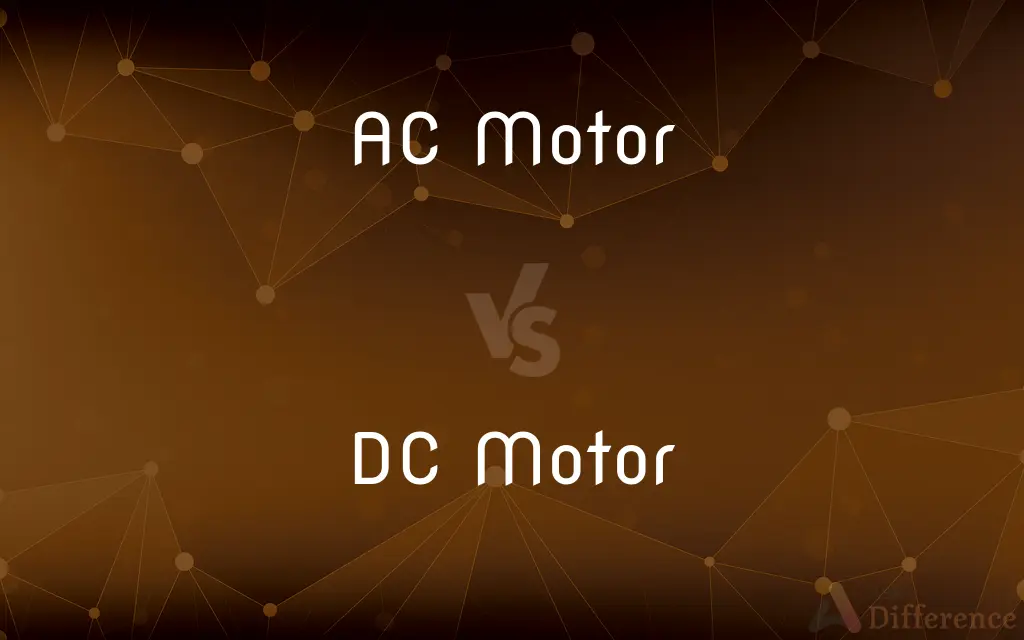AC Motor vs. DC Motor — What's the Difference?
By Tayyaba Rehman — Published on January 6, 2024
AC motors are powered by alternating current and are commonly used for industrial applications; DC motors are powered by direct current and offer precise control.

Difference Between AC Motor and DC Motor
Table of Contents
ADVERTISEMENT
Key Differences
An AC (Alternating Current) motor is powered by an alternating current, which means the direction of the current and voltage periodically reverses. This feature makes AC motors simpler in design and more durable, often used in high-power applications like industrial machinery and home appliances. Conversely, a DC (Direct Current) motor uses direct current, where the current flows in one direction. DC motors are known for their precise control and are used in applications where motor speed needs to be precisely regulated.
The construction of AC motors is generally more rugged and less complex, which often results in a longer lifespan and lower maintenance costs. They are more suitable for applications requiring high power and efficiency over extended periods. On the other hand, DC motors have more components like brushes and commutators, which may require more maintenance. However, this design allows for better control of the motor speed and torque.
AC motors are typically less expensive to manufacture and are more efficient in converting electrical energy into mechanical energy. They are often used in large-scale industrial settings. DC motors, while offering greater control, tend to be more expensive due to their complex design and are used in smaller, precision applications like electronic devices, toys, and automobiles.
In terms of functionality, AC motors are ideal for applications that require a constant speed, while DC motors are better suited for applications where speed needs to be varied. AC motors can run at a set speed, making them ideal for applications like fans, blowers, and pumps. DC motors, with their ability to vary speed and torque, are suitable for applications like electric vehicles and robotics.
In conclusion, both AC and DC motors have distinct advantages and are suited for different applications. AC motors are preferred for their simplicity, durability, and efficiency in constant-speed applications, while DC motors are chosen for their precise control in speed and torque, despite their higher maintenance needs.
ADVERTISEMENT
Comparison Chart
Current Type
Alternating current (AC)
Direct current (DC)
Construction Complexity
Less complex, more rugged
More complex with brushes and commutators
Speed Control
Fixed speed, less control
Variable speed, precise control
Maintenance
Generally lower maintenance
Higher due to brushes and commutators
Cost
Typically less expensive
More expensive due to construction
Typical Applications
Industrial machinery, home appliances
Electric vehicles, robotics, electronic devices
Energy Efficiency
More efficient in constant-speed applications
Efficient in applications requiring speed control
Lifespan
Longer due to simpler design
Shorter due to wear on components
Compare with Definitions
AC Motor
AC motors are common in industrial and household appliances.
Most washing machines employ an AC motor for their operations.
DC Motor
A DC motor is powered by direct current.
The remote-controlled car uses a DC motor for precise speed control.
AC Motor
An AC motor is powered by alternating current.
The air conditioner uses an AC motor to drive the fan.
DC Motor
DC motors provide greater control over speed and torque.
The electric car's DC motor offers excellent torque at low speeds.
AC Motor
AC motors typically operate at a constant speed.
The ceiling fan's AC motor ensures a steady airflow.
DC Motor
DC motors are essential in precision electronic devices.
Our computer-controlled telescope uses a DC motor for fine positioning.
AC Motor
AC motors are generally more efficient for high power applications.
Our industrial drill press uses an efficient AC motor.
DC Motor
DC motors include components like brushes for operation.
The model train's DC motor uses brushes for electrical contact.
AC Motor
AC motors are known for their durable construction.
The factory conveyor system uses an AC motor for its long-lasting performance.
DC Motor
DC motors are used for applications requiring variable speed.
Our robotic arm's DC motor allows for precise movement adjustments.
Common Curiosities
What is an AC motor?
An AC motor is an electric motor driven by alternating current (AC).
What makes DC motors suitable for electric vehicles?
DC motors' precise speed and torque control make them suitable for electric vehicles.
Where are AC motors commonly used?
AC motors are commonly used in industrial machines, home appliances, and large power tools.
Why do DC motors require more maintenance?
The brushes and commutators in DC motors wear out and need periodic replacement.
What is a DC motor?
A DC motor is an electric motor that runs on direct current (DC).
What are the disadvantages of AC motors?
They have less speed control and are not as efficient for variable-speed tasks as DC motors.
Can AC motors run at variable speeds?
While traditionally less common, variable-speed AC motors are available but often more complex.
Are DC motors more expensive than AC motors?
Generally, yes, due to their construction complexity, DC motors tend to be more expensive.
Are AC motors more efficient than DC motors?
AC motors are more efficient in applications that don't require variable speed.
What applications are brushless DC motors used for?
Brushless DC motors are used in high-end applications like drones, electric vehicles, and computer hardware.
Can I use a DC motor for home appliances?
While possible, DC motors are less common in standard home appliances due to their cost and complexity.
Why are DC motors used in robotics?
Their precise control over speed and torque makes them ideal for robotics.
What are the main advantages of AC motors?
The main advantages are durability, lower maintenance, and efficiency in constant-speed applications.
Do all DC motors have brushes?
Not all; brushless DC motors are also available, offering longer life and less maintenance.
Can AC motors be powered by a DC source?
Not directly; AC motors require an AC power source or an inverter to convert DC to AC.
Share Your Discovery

Previous Comparison
Complete Ionic Equation vs. Net Ionic EquationAuthor Spotlight
Written by
Tayyaba RehmanTayyaba Rehman is a distinguished writer, currently serving as a primary contributor to askdifference.com. As a researcher in semantics and etymology, Tayyaba's passion for the complexity of languages and their distinctions has found a perfect home on the platform. Tayyaba delves into the intricacies of language, distinguishing between commonly confused words and phrases, thereby providing clarity for readers worldwide.













































